Advice
A rider’s mental preparation
21 February 2023
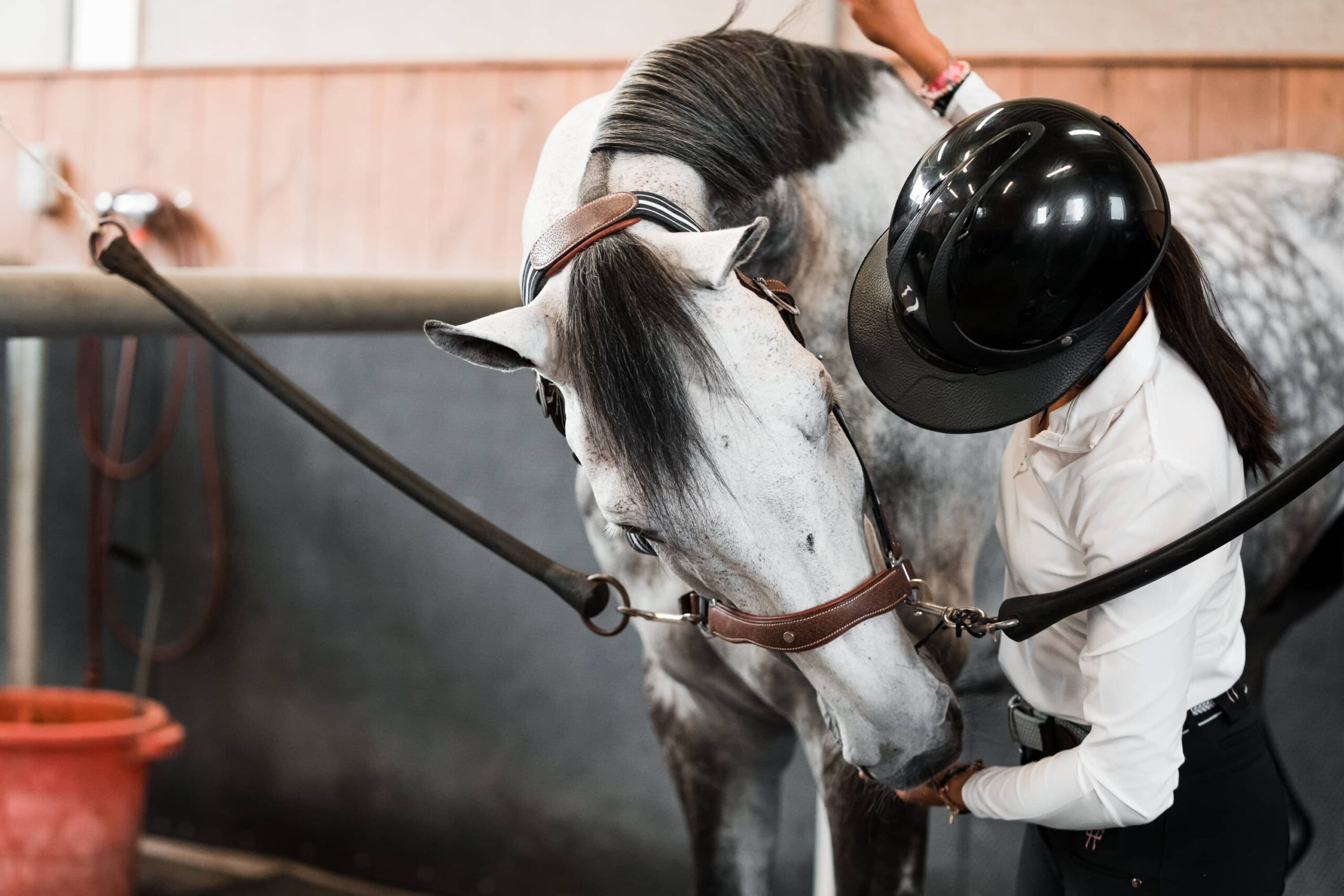
Advice
21 February 2023

Mental preparation is taking up an increasing place in the sport of riding. While technique, tactics and fitness are the 3 main pillars to sporting achievement, mindset should be the 4th. It is vital to work on mental preparation as riding is a sport that you practice as a duo.
Maxime Chataignier is an ex-elite speed skater who competed for the French Olympic Short Track team for 10 years. During his career he took part in 3 Winter Olympics, winning a gold and a bronze medal in the 2010 European Championships and finishing top of the overall rankings in the 1,500 m in 2011.
Maxime is now a mental skills coach with some experience in the riding sector and he agreed to answer our questions. What are the recurring problems for riders and how are they resolved? How do you manage your stress as well as that of your horse’s when you compete? How should you react when you put in a poor performance?
Maxime answers these questions and gives you tips to improve your mental preparation to perform better when you compete.
I have a multi-faceted role when I work with elite athletes.
Firstly, I help them to better control their emotions, grasp the goals they’ve set themselves and deal with the pressure. That’s the essence of my work.
I frequently act as an organiser to relieve congestion in their daily tasks or ecosystems.
It’s a bit more specific when it comes to riders as riding is a quite an unusual sport. Elite riders have their own set-up, i.e., a stable or stud where they practice. That means that there is an economic model at work in addition to competing in sporting events.
By contrast, when I was an elite athlete, I was paid to play sport and when I wasn’t competing or training, I had little to manage. The day I retired, I had to switch career. I knew it, so it was a plan I had to prepare in advance.
Compared to many athletes, things are more interlinked for a rider. They have an economic model that works in conjunction with their sporting success. So, if their stables are doing well, this generates income which gives them some peace of mind to focus on competing. If the competition results are good, they earn money and a reputation which reflects well on their business. So, these are really aspects that we can work on together.
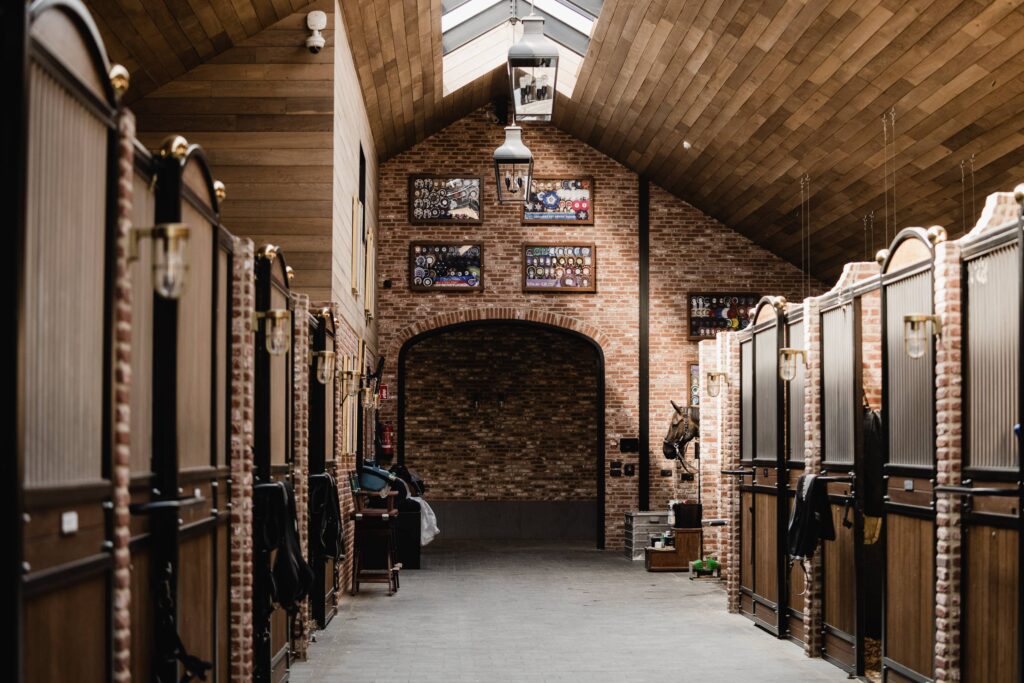
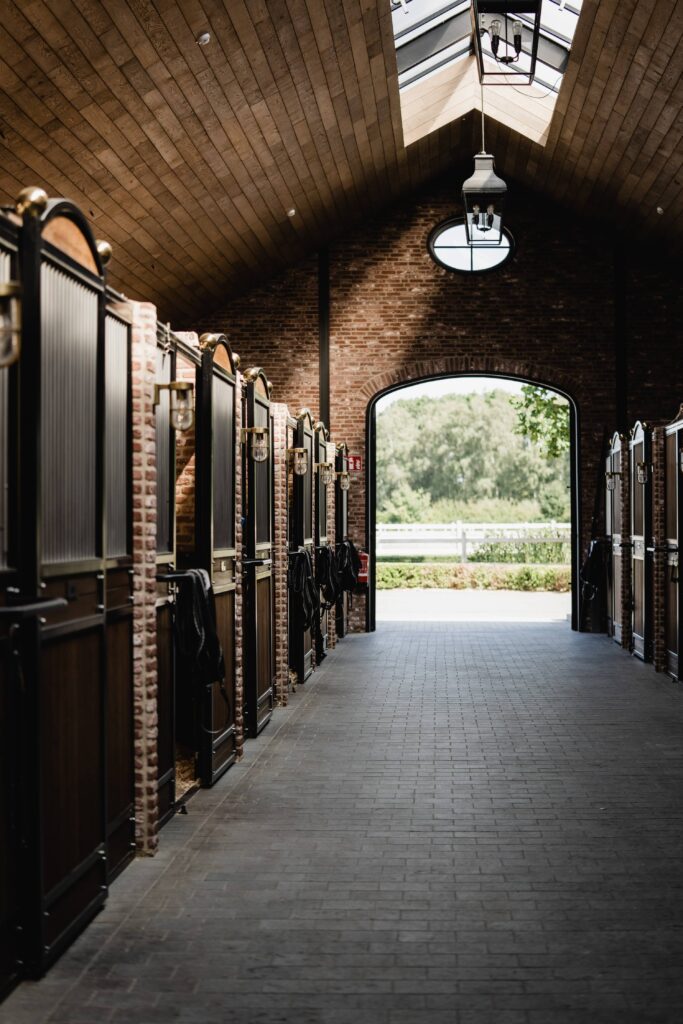
For instance, an elite rider like Gwen (Ed. Fer is the name of her stables), has a support team of some fifteen people. They don’t all work full-time or every day but, for instance, Andy Booth (who works with Gwendolen Fer on equine ethology). Read more about their meeting here) is one of those 15 people. There are Community Managers too. They aren’t directly involved in the riding but they are key players nowadays to communicate with partners, etc.
When I start working with an elite rider I also focus on that. In practice, I ask myself what needs to be done. Is it stress management? If so, I’ll provide the basics to deal with that rapidly.
But after that, we’ll conduct an audit of the entire organisation. The goal is to switch from the fitness and technical aspects to dig deeper. That also applies to mental training for the horse when we call in professionals like Andy. You might not realise it but mindset can create lots of issues in everyday life, so we try to sort it all out.
Mental preparation is a catch-all term which comprises many aspects. That said, I think my approach with elite riders is more about day-to-day guidance. Your state of mind can be upset by lots of things such as poor organisation and failures, etc. So, I try to build something as robust as possible and keep mindsets positive on a daily basis.
The recurring issue for riders is managing pressure or stress.
Amateur riders mostly have to deal with stress. They might find the circuit to be of a really high standard, that their horse is very good but that they fall short. So, we help them manage their emotions and stress, to properly study the level of difficulty and persuade themselves that can do it.
Managing pressure relates to when the stakes are high and the consequences of failure could be really damaging.
Then there are events like the Grand National, where riders are used to competing. But, if you’re in an Olympic Games year, you mustn’t hold back to try to qualify. Elite athletes have to manage pressure more than stress.
Elite riders are under more pressure given their parters, earnings, competition fees, the price of horses and the consequences, etc.
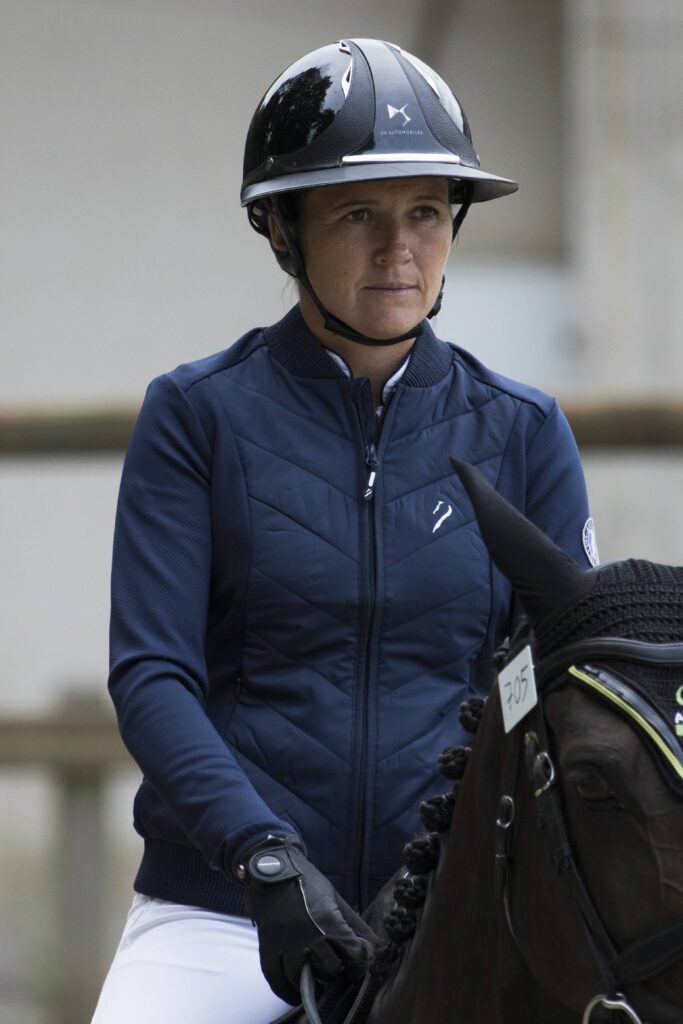
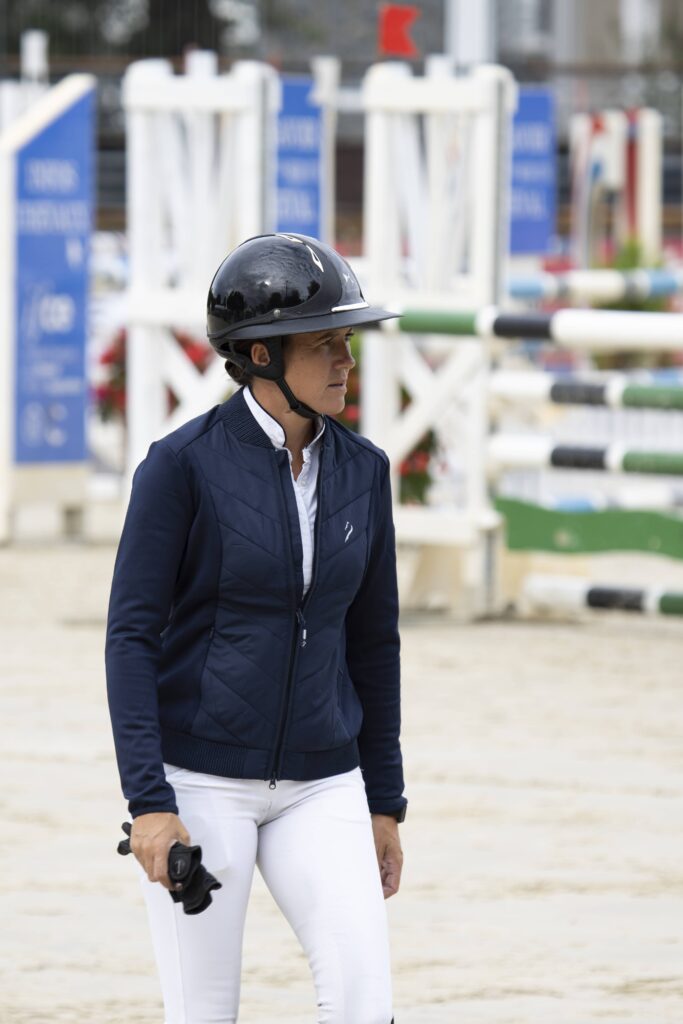
The simplest advice is the chocolate cake recipe.
If you’re faced with a course or difficulty, tell yourself to use the same method for making a cake by asking yourself, “What ingredients do I need to make a great cake?”
Often, when we are really stressed, we tend to focus on the things we shouldn’t put in the cake. Have you ever seen a recipe that starts with “whatever you do, don’t add this ingredient“, or things like that. When they are about to ride a course, some riders say, “I mustn’t pull, I mustn’t push. I mustn’t do that or it’ll go wrong“. So we tend to pit ourselves against the bar or a refusal and failure.
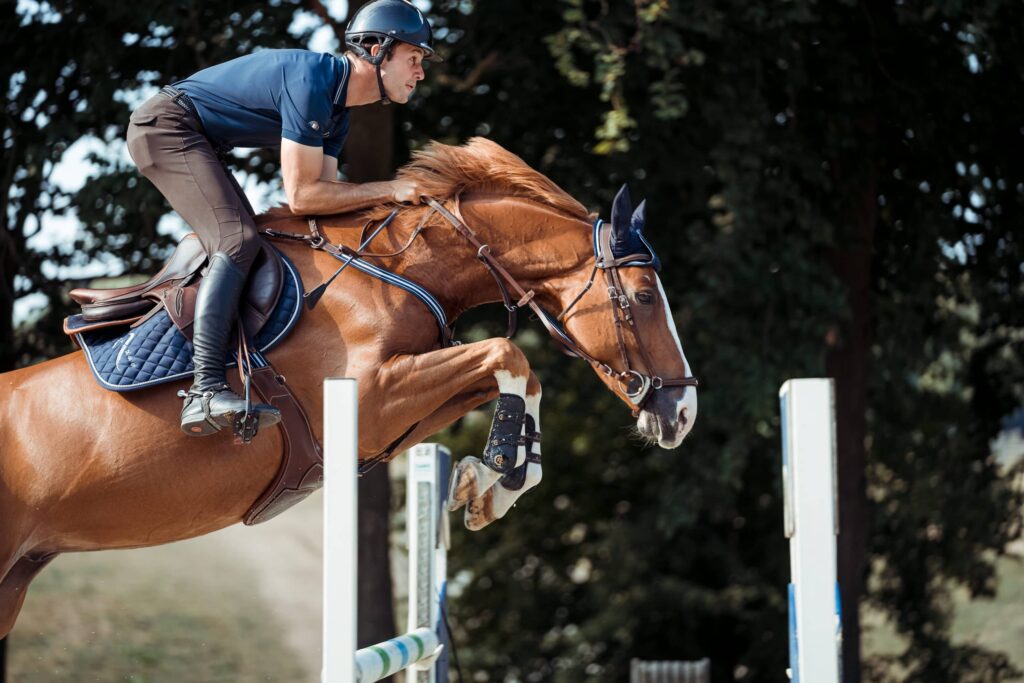
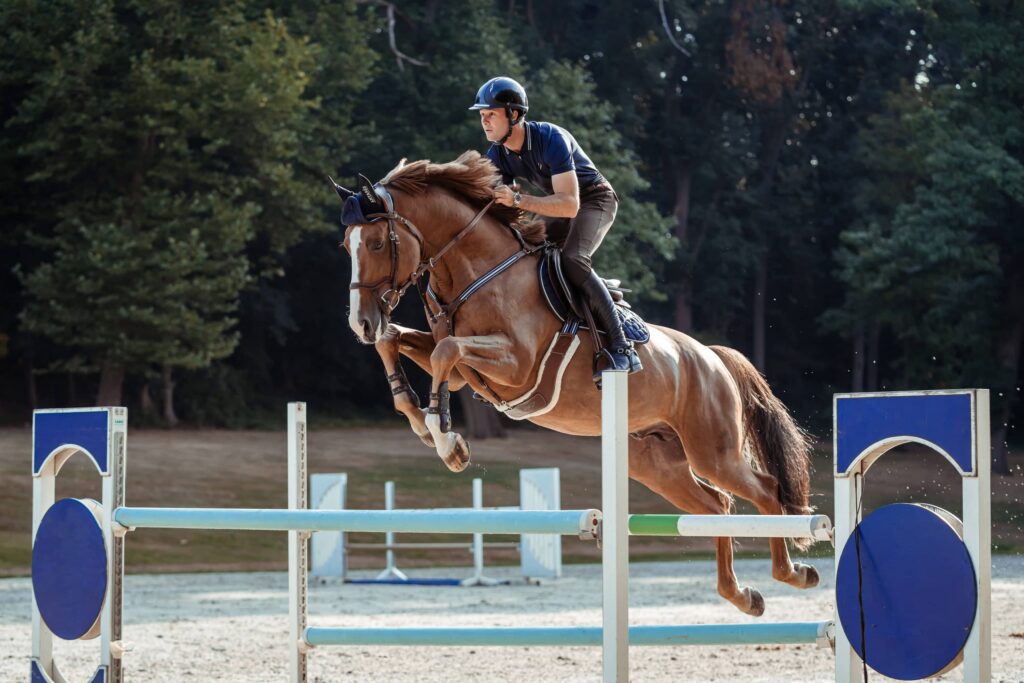
My strategy for success is to cut to the chase and focus so that things go smoothly. When you ride at home and train every day, you progress in that sense. Your aids are more accurate, you sit in more precise positions, for the better and for success. When you compete, you tend to focus on the mistakes you don’t want to make. We know that the mental capacities only functions when there are positive stimuli. The brain doesn’t work with negative inputs. So, if you tell your brain, “I mustn’t pull or push“, your head is going to scrambled and you’re not going to think clearly. You need to focus on what goes well and separate it in your mind to focus all your energy on it.
Another tip is to direct your effort on all the actions you’ll need to reach your goal if, for example, if you want to jump a clear round. For instance, I’ll go this way and then there, etc. But if you say, “I want to go to Saintes”, it doesn’t actually mean you’ll make it to Saintes. You need to say, “I want a clear round”, so at fence 1 I’m going to do this and at fence 2 I’m going to do that. I’ll remember to squeeze with my leg in the turn, etc.
The more you think about these things, the less you focus on stress, pressure and what’s happening around you. You focus your efforts more.
The aim of this logbook is actually to help young (and older) riders to analyse their daily efforts. It’s not about just being a perfectionist when you train or adopting an “exam” mentality, i.e., when you turn up a training and hope to do everything perfectly with one hand tied behind your back. If you do that, you won’t have the right mindset. The coach’s aim is not to make you win but to make you progress. He/she will take you out of your comfort zone.
So, the key is to say, we’re going to properly organise your preparation and we’ll try to connect you to the goals that you must accomplish now. You know, there are lots of riders that forge a career but have no idea where they’re going. They’re like wagons coupled to the coach’s train whereas I really want to make locomotives.
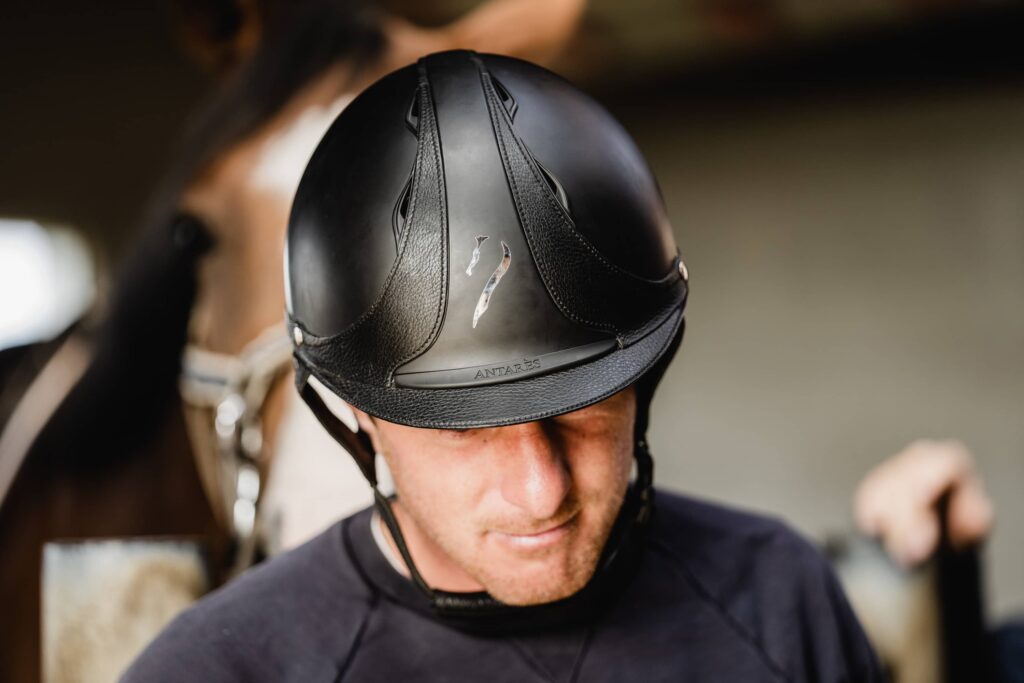
You can use the logbook to do a debriefing after your training sessions. There’s the daily programme, ‘strengths’ and ‘weaknesses’ and a key section for setting goals for the next session. There are plenty of tools to help riders in their preparation. We’ve also added QR codes to a YouTube page where riders can find additional digital content.
Also, at the end there’s a section called “expert advice” . The logbook covers a wide range of subjects, like an equipment check list, with pages for notes, or managing an injury with a top osteopath, for example. Everyone can use it whatever their level.
In the first part of this interview, Maxime Chataigner talked to us about a rider’s mental preparation. Dealing with your emotions is key to achievement when competing, yet it takes two to ride so you also have to deal with managing the horse’s emotions. In part two of this interview, Maxime tells us how a rider’s mental preparation can have a positive effect on the horse’s performance.
[ Continuation of the article: working on your mental with your horse ]